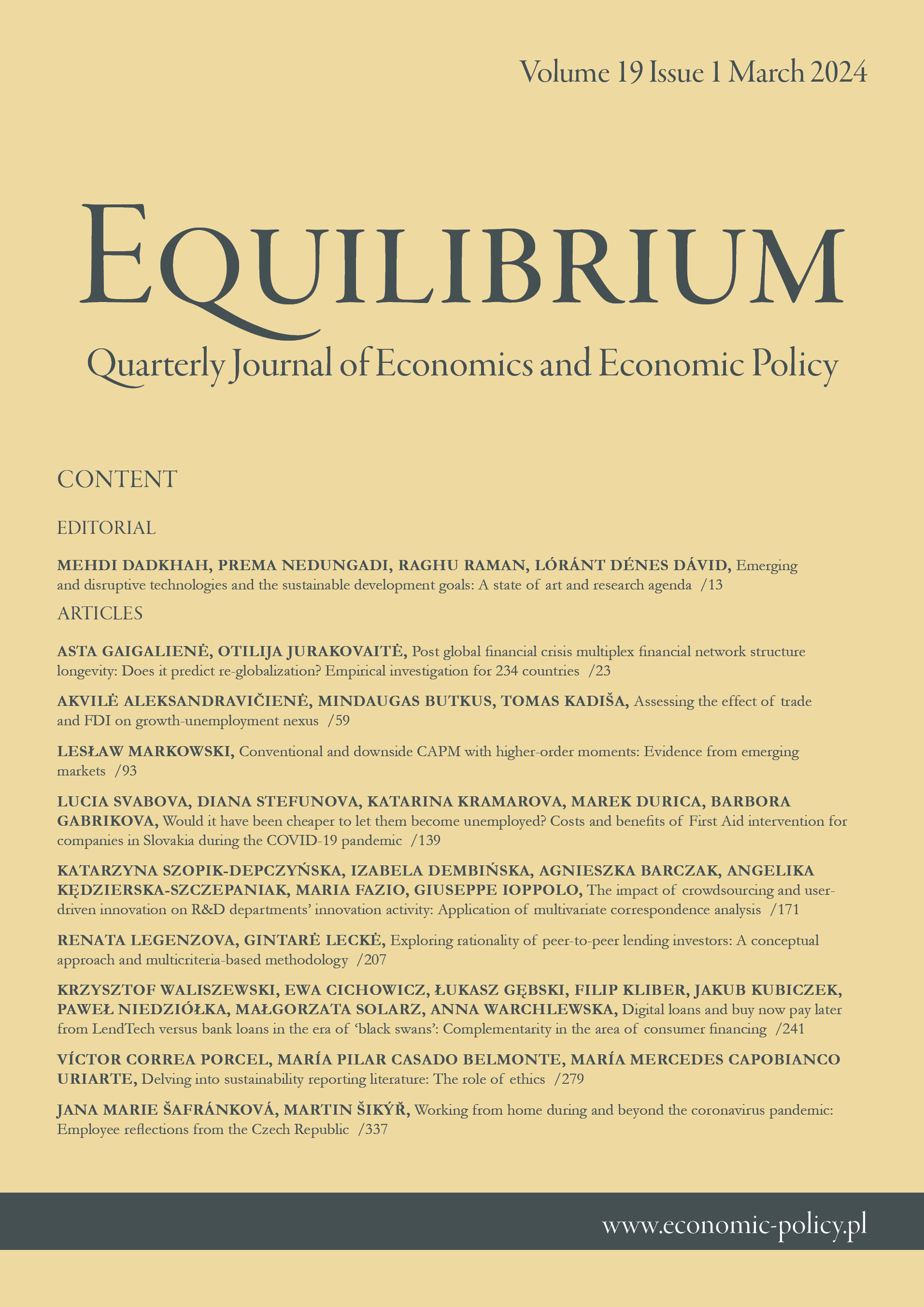全球风险对社会责任指数和传统股票指数表现的影响
IF 6.2
Q1 ECONOMICS
Equilibrium-Quarterly Journal of Economics and Economic Policy
Pub Date : 2017-12-31
DOI:10.24136/EQ.V12I4.34
引用次数: 7
摘要
研究背景:在过去的几十年里,社会责任投资已经发展成为一个重要而有影响力的投资类别。那么是什么支持了SRI的发展呢?新古典主义方法认为,投资的吸引力应该源于令投资者满意的风险回报关系。然而,在众多研究论文中进行的SRI与传统投资的绩效分析往往得出相互矛盾的结论。如果说金融因素不能解释SRI现象,那么非金融因素可能在现代SRI市场的形成中起到了决定性的作用。文章的目的:本文的目的是分析社会责任与各自的传统指标在全球风险高、低和未知时期的金融投资绩效。因此,验证了以下研究假设:SR指数在高风险期的财务表现优于低风险期。这一假设是合理的,即当选择SRI时,投资者比选择其他投资时进行更长的投资期限,而不受此类验证的约束。方法:在SR指数中,我们选择了三个指数与传统指数进行比较:DJSI US与DJITR(美国),DJSI Korea与KOSPI(韩国),Respect Index与WIG20TR(波兰)。VIX指数被用作衡量全球风险厌恶程度的指标。为了衡量SR指数与传统指数在不同风险期的相对表现,我们采用了风险调整后的绩效指标,包括RSD、Sharpe和Treynor比率、传统CAPM和非对称CAPM。研究结果与附加值:研究表明,无论全球风险如何,传统和社会责任指数在风险和回报方面没有统计学差异。我们的研究证实,不能仅仅通过简化理性选择的棱镜来分析正在崛起的、对社会负责的投资市场。此外,还应从道德哲学和行为经济学的角度进行分析,包括投资者的社会心理特征。本文章由计算机程序翻译,如有差异,请以英文原文为准。
The impact of global risk on the performance of socially responsible and conventional stock indices
Research background: In the last decades social responsible investment has evolved into an important and influential investment class. What supports then the development of SRI? The neoclassical approach suggests that the attractiveness of investment should result from the risk-return relationship that is satisfying for the investor. However, the performance analysis of SRI vs. conventional investment, conducted in numerous research papers, often delivers contradictory conclusions. If financial factors could not explain the phenomenon of SRI, nonfinancial factors may have played a decisive role in the formation of modern SRI market. Purpose of the article: The purpose of this paper is to analyze financial investment performance of socially responsible vs. respective conventional indices in the periods of high, low and unidentified global risk. Therefore, a following research hypothesis was verified: SR indices perform financially better in high-risk periods than in low-risk periods. This hypothesis is justified by the assumption that, when selecting SRI, investors go by a longer investment horizon than they do when selecting other investments, not subject to such verification. Methods: Among SR indices, we chose three to compare them with their conventional counterparts: DJSI US vs. DJITR (USA), DJSI Korea vs. KOSPI (South Korea) and Respect Index vs. WIG20TR (Poland). The VIX index was used as the global measure of risk aversion. To measure the relative performance of SR and conventional indices in different risk periods, we applied risk-adjusted performance measures, including RSD, Sharpe and Treynor ratios, traditional and asymmetrical CAPM. Findings & Value added: The research shows that conventional and socially responsible indices do not differ statistically in terms of risk and return irrespective of global risk. Our research confirms that the rising, socially responsible, investment market cannot be analyzed only through the prism of simplified rational choices. Additionally, it should be analyzed in terms of moral philosophy and behavioral economics, including the psycho-social features of investors.
求助全文
通过发布文献求助,成功后即可免费获取论文全文。
去求助
来源期刊
CiteScore
9.20
自引率
3.50%
发文量
28
审稿时长
36 weeks
期刊介绍:
Equilibrium. Quarterly Journal of Economics and Economic Policy is a scientific journal dedicated to economics, which is the result of close cooperation between the Instytut Badań Gospodarczych/Institute of Economic Research (Poland) and Polish Economic Society and leading European universities. The journal constitutes a platform for exchange of views of the scientific community, as well as reflects the current status and trends of world science and economy.
The journal especially welcome empirical articles making use of quantitative methods in: Macroeconomics and Monetary Economics, International Economics, Financial Economics and Banking, Public Economics, Business Economics, Labor and Demographic Economics, Economic Development, and Technological Change, and Growth.
Current most preferable topics and special issues:
The economics of artificial intelligence: business potentials and risks;
Digitalization and entrepreneurship in economics;
Sustainable socio-economic development, environmental and ecological economics;
Transition in the energy market (improving energy efficiency, alternative energy sources, renewable energy, energy security).

 求助内容:
求助内容: 应助结果提醒方式:
应助结果提醒方式:


